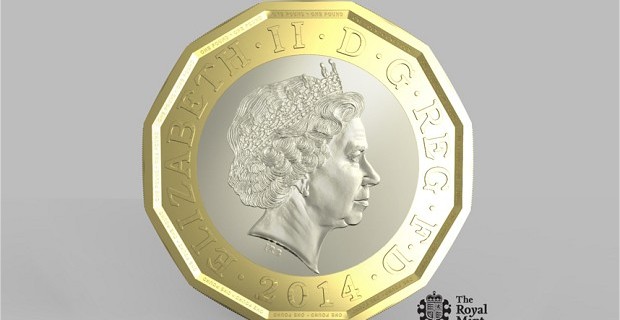Q&A: Counting the cost of the new £1 coin

The Royal Mint is taking on the counterfeiters by replacing the humble £1 coin – but businesses say there is a flipside
In today’s budget, the UK Chancellor, George Osborne, will announce the replacement of the £1 coin from 2017 amid concerns about the current design’s vulnerability to counterfeiting.
The new coin will be based on the threepenny bit that disappeared from circulation after decimalisation in the 1970s, with designers claiming it will be “the most secure in the world”.
Why is it being changed?
The rounded £1 coin has been in use since 1983, with £1.5bn in circulation in March 2013, but ministers say the old technology used to make the coins makes it too easy for counterfeiters to copy. The new design will be in the same gold and silver colours as the euro and is particularly hard to copy. “With advances in technology making high-value coins like the £1 ever more vulnerable to counterfeiters, it’s vital that we keep several paces ahead of the criminals to maintain the integrity of our currency,” said Osborne.
How big a problem are fake coins?
The Royal Mint estimates that around 3% of the £1 coins are fake – which could mean more than £45m worth of counterfeit coins are in circulation. Individuals and companies are not allowed to pass on coins they know to be counterfeit, so ending up with fakes can be costly.
Will the new coin fit parking and vending machines?
Not as it stands, according to the Royal Mint. Andrew Mills, the head of circulation for the Mint, told the BBC it was “a likelihood” that the coin would not fit in machines designed for the existing £1. The new coin will not be accepted by many automated vending and ticket machines and may not fit in supermarket trolley or locker slots.
The change could prove expensive for firms and councils needing to alter parking meters, vending machines and shopping trolleys. When new, thicker 5p and 10p coins were introduced in 2012, town halls complained that the switch could cost them £5.5m.
Won’t it be a similar size?
Yes. But the need to change machines may arise from the “metal composition” of the new coin, according to Jo Audley of the British Parking Association. “The current security elements built into machines are designed to measure the metal composition of the coin,” she says. “So if they’re considered conterfeit or the machine fails to read the composition correctly, they are rejected. At present, 4% of £1 coins used in parking meters are counterfeit. We need to to ascertain what metals are being used and how this recallibrates into the machine, and we don’t know yet.”
The cost of a change, if needed, will depend on what parts in the current machines need altering, and how this is rolled out across different parking schemes, but the association says all machines, of which there are around 100,000, could need changing. “A lot of companies are using cashless systems through mobile apps and credit card payments,” said Audley.
If the machines are upgraded from a standard coin-operated machine to offering a cashless payments, this will push up the cost of upgrading, she added.
What about businesses?
The cost is expected to mainly fall on firms operating around 400,000 machines – selling anything from train tickets to snacks – while payphones, fruit machines and supermarket trolleys will also have to be changed.
A spokesman for the British Retail Consortium welcomed the news but said: “It is important for industry that any potential change is effectively planned and managed in order to minimise hardware costs for business. The BRC will engage with both the government and the Royal Mint to support a smooth transition period.”
John Allan, national chairman of the Federation of Small Businesses, said: “Small firms who deal with low-priced items are more likely to be affected by fake currency but we do have concerns about the extra costs of introducing a new pound coin. For example, small firms may have to pay out to replace machinery. But, there’s no doubt counterfeit coins and notes can seriously damage small businesses. Not only are they worthless but a business could be prosecuted if it passes them on.”
How much will the change cost?
The Royal Mint has not said how much it will cost to make the new coins, but it says £2m has so far been invested in developing the new security techniques used on the machines. Mills said 90% of the changes were likely to be straightforward, and cost around £10 to £12 per machine, and that cost of changing all the machines in the country is likely to between £15 and £20m.
However the British Parking Association says just changing parking machines could cost £50m. And, of course, there’s also the cost to consumers of replacing all those trolley token keyrings.
Source: theguardian





























